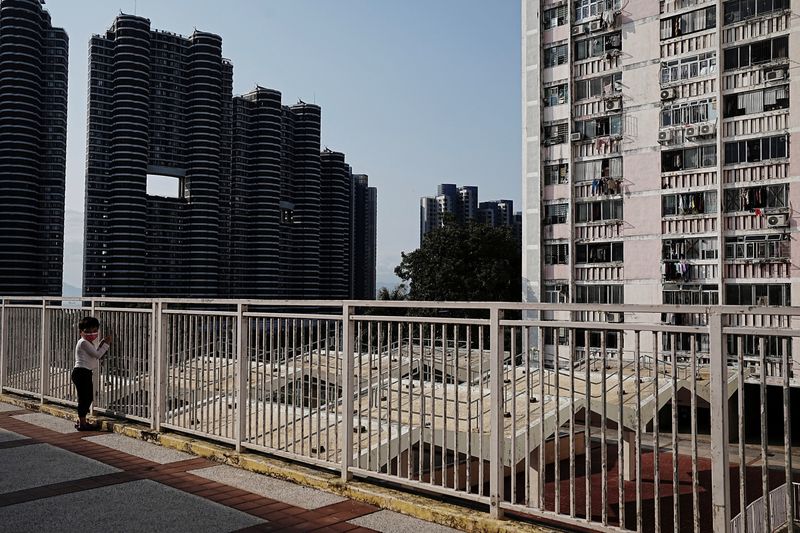By Clare Jim
HONG KONG (Reuters) – Some developers in Hong Kong are turning to the apartment rental and leasing market to weather a prolonged downturn in the property market and meet rising demand for rental housing from mainland Chinese professionals and students.
The developers’ change of strategy is a rare move in a city with some of the world’s highest property prices and underscores Hong Kong’s changing demographics.
The former British colony saw an exodus of residents, including foreigners, following anti-government protests in 2019 and the subsequent pandemic. The population gap will now largely be filled by the influx of mainland Chinese after a series of talent-welcoming programs were launched in 2022.
Latest data on Wednesday showed that rents for private homes in Hong Kong rose to their highest level in nearly five years in July, while property prices fell 22 percent over the same period.
With locals also opting to rent rather than buy due to the uncertain economic outlook, many real estate agents expect the diverging trend in property prices and rents to continue in the near future.
Earlier this month, Henderson Land (OTC:), a major Hong Kong-based property developer, announced that it would offer part of its Baker Circle Dover (NYSE:) project on the Kowloon Peninsula for lease rather than for sale.
It was not disclosed how many units are available for rent, but it was said that more than 20 units were leased within a week, with monthly rents ranging from around HK$14,000 (US$1,795) for a studio to HK$19,000 for a one-bedroom apartment.
Traditionally, developers in a residential development usually offer all of their apartments for sale.
“Due to the various measures taken by the government to attract talent, demand in the residential leasing market has skyrocketed,” Henderson said in a statement. “(Therefore, we are) leveraging some of the previous product launches to respond to the market.”
Its smaller competitor Chevalier International also announced earlier this month that it would keep all 58 apartments in a new building in a neighboring district vacant and rent them out to meet demand.
Such projects come after the city approved 210,000 applications under its talent programs launched two years ago. One of these programs grants a 24-month visa to stay in Hong Kong to graduates of the world’s top 100 universities or those with an annual income of at least HK$2.5 million.
140,000 of the approved applications have already arrived in Hong Kong, Hong Kong’s chief executive John Lee said this week. Experts in the real estate market assume that the majority of them come from mainland China.
STUDENT APARTMENTS
Real estate investors are also increasingly turning to the rental market, renovating various properties, including hotels, commercial and residential buildings, to convert them into student housing, brokers say.
“There is currently greater demand for student accommodation because the ratio (of foreign students) has increased and many mainland Chinese are also unable to get a mortgage loan for an apartment,” says Raymond Lee, CEO for Greater China at real estate consultancy Savills.
The Hong Kong government announced last year that starting from the 2024 academic year, the quota for non-local students at the eight universities would double to 40 percent of admissions.
In Hong Kong, at least three real estate transactions have taken place in the last two months to meet increasing demand from students.
The Hong Kong Metropolitan University bought a newly completed 255-room hotel in Hung Hom for HK$1 billion in June to use as a student residence, the largest student residence deal to date.
Although Lee warned that rents in the student housing market could fall in the long term if supply increases quickly, students are willing to pay higher rent for fear of being excluded from the supply.
“I am glad that I got the new lease in June, which is HK$500 more expensive per person than my previous apartment,” says Julia Zhong, a student from the northeastern Chinese city of Shenyang who recently moved into a two-bedroom apartment near the University of Hong Kong and shares it with her roommate.

“I heard that rents became significantly more expensive in July and August.”
($ = 7.7985 Hong Kong dollars)

